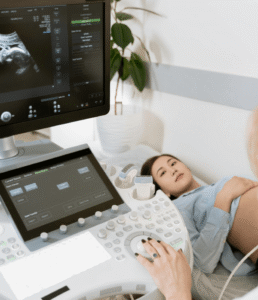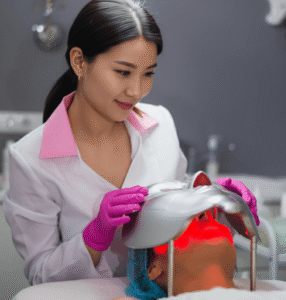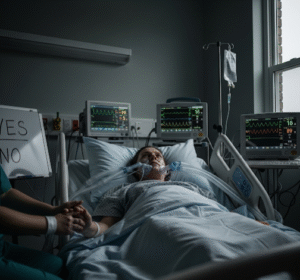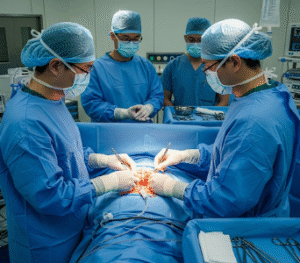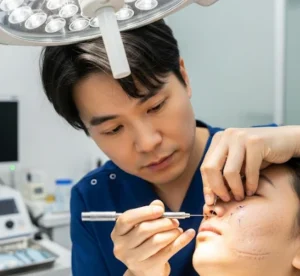Overview
Clostridioides difficile (C. diff) infection is a bacterial illness that causes inflammation of the colon (colitis), ranging from mild diarrhea to life-threatening toxic megacolon. It most often occurs after recent antibiotic use or prolonged hospitalization. In Korea, robust infection-control programs and modern diagnostics help detect and treat cases quickly, especially in high-risk settings such as tertiary hospitals and long-term care facilities.
What is C. diff Infection?
C. diff is a spore-forming, toxin-producing bacterium that disrupts normal gut flora, typically after antibiotic exposure. Toxins A and B damage the intestinal lining, leading to diarrhea and colitis. Spores can survive on surfaces for months and spread via the fecal–oral route, making hand hygiene and environmental cleaning essential.
Symptoms
- Watery diarrhea (≥3 loose stools in 24 hours)
- Abdominal cramping, tenderness, or bloating
- Fever, nausea, loss of appetite
- Leukocytosis (high white blood cell count)
- In severe disease: dehydration, pseudomembranous colitis, ileus, toxic megacolon, sepsis
Causes
- Overgrowth of C. diff in the colon after disruption of normal microbiota, most commonly from antibiotics.
- Transmission via contaminated hands, surfaces, or medical equipment (spores are alcohol-resistant).
- Increased risk with gastric acid suppression (e.g., chronic PPI use).
Risk Factors
- Recent antibiotics (clindamycin, fluoroquinolones, cephalosporins, broad-spectrum β-lactams)
- Hospitalization or residence in long-term care
- Age ≥65 years
- Prior C. diff infection
- Immunocompromised states (chemotherapy, transplant, chronic steroids)
- GI surgery/procedures
- PPI or H2-blocker use
- Inflammatory bowel disease
Complications
- Severe colitis, dehydration, electrolyte imbalance
- Toxic megacolon, bowel perforation, peritonitis
- Sepsis and multi-organ failure
- Recurrence (about 20–30% after first episode; higher after multiple episodes)
- Mortality in fulminant cases
Prevention
- Use antibiotics only when necessary; select narrow-spectrum agents and shortest effective duration.
- Contact precautions in healthcare settings: gloves, gowns, patient isolation when indicated.
- Handwashing with soap and water (alcohol gel does not kill spores).
- Environmental cleaning with sporicidal agents (e.g., bleach) on high-touch surfaces.
- Review need for PPI therapy; deprescribe when appropriate.
- For high-risk inpatients, consider probiotics (per clinician judgment) to reduce antibiotic-associated diarrhea.
Treatment Options in Korea
Diagnosis
- Stool testing using a multistep algorithm:
- GDH antigen + toxin EIA with NAAT (PCR) confirmation, or
- NAAT with toxin testing to distinguish colonization vs. active toxin production.
- Endoscopy rarely needed; shows pseudomembranes in severe disease.
- Labs for severity: WBC, creatinine; CT abdomen if fulminant disease suspected.
Initial Episode (Non-severe to Severe)
- First-line oral therapy:
- Fidaxomicin (preferred where available) or
- Vancomycin oral (standard option across Korean hospitals).
- Metronidazole PO only if above agents are unavailable and disease is mild (not preferred).
Fulminant (Severe-Complicated) Disease
- Vancomycin PO/NG high dose plus IV metronidazole.
- If ileus: consider rectal vancomycin instillation.
- Early surgical consult (subtotal colectomy) for toxic megacolon, perforation, or refractory shock.
Recurrent C. diff
- Fidaxomicin (standard or extended-pulsed regimen) or
- Vancomycin taper-and-pulse regimen.
- Bezlotoxumab (monoclonal antibody to toxin B) as adjunct for patients at high risk of recurrence (elderly, immunocompromised, multiple prior episodes).
- Fecal Microbiota Transplantation (FMT) for multiple recurrences or refractory disease—available at select tertiary centers in Korea under strict protocols.
Supportive Care
- Aggressive oral/IV hydration and electrolyte correction.
- Stop inciting antibiotics when possible.
- Avoid anti-motility agents (e.g., loperamide) in acute colitis.


